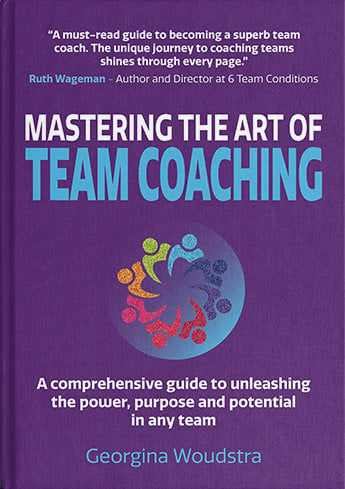Team coaching is a game changer. It’s the most significant movement in the history of coaching. I’d even venture to say that the future of coaching is team coaching because, more than ever before, the world needs greater collaboration. I do many speaking events and workshops to demystify team coaching.
The questions I get asked reveal three core underlying concerns for team coaches.
The desire to get it right
The desire for certainty and three,
The desire to ensure success.
All of this is because coaches want to add value. They want to make a difference. But the truth is that working with teams is messy and unpredictable, and no matter how brilliant your methodology or how effective your high-performance team coaching system is, success isn’t guaranteed. Some team leaders fail to grasp the impact of their leadership and the style of their leadership on teams. Team membership changes, organizational needs and priorities change. Many teams are full of untapped potential. And just as in one-to-one coaching, teams have to want to learn and change.
We know that we can dramatically increase the likelihood of success in team coaching with good contracting, It’s crystal clear that contracting is the weakest link. I’ve learned the hard way in my practice as a team coach,
About 15 years ago, I was asked to coach a team who wanted more trust and to be more cohesive as a team; I proposed starting with individual interviews with team members, followed by an initial session where we’d looked at what in the group would help and what would hinder trust and cohesion.
I contracted with a leader around the initial desired outcomes from the coaching, agreeing that the team learning goals would be clarified and agreed with the group. In the first Session, after conducting the interviews, the leader asked to see the results of the interviews before the team session to enable him to prepare at the start of each interview.
One of the themes that emerged from the interviews was that team members were unable to say what they thought. I clarified that I’d record the team’s comments and collate them into themes, but then nothing would be attributed to any single team member. We would review the findings together in the first team coaching Session.
What emerged from the interviews was the team were constantly second-guessing what the leader wanted to hear for fear of getting it wrong and suffering the consequences. They said the leader often yelled, banged his fist on the table, and threatened people with the sack. When I shared the interview results with the leader, he was furious and demanded to know who had said this about him.
When I refused to name individuals, he got enraged and said he would not proceed with team coaching. I had failed to contract clearly around several things. Most significantly, that confidentiality means that I will not share what any team member says with another, not even a leader. How a team is led has a significant impact on team effectiveness.
So my team coaching will include reflecting on the effectiveness of team leadership. Here’s an example of when good contracting made a real difference.
I was recently coaching a founding team who were so mired in conflict that they hadn’t met for almost a year. Decisions were only being made at the individual level, and business-wide decisions were on hold. Shareholders were rapidly losing confidence, and the team was struggling to get unstuck.
I begin with individual interviews before meeting together with the team. My initial conversation was with one founder, who then followed up by copying the other founders. He proposed that I conduct individual interviews before meeting together with the team. I refused to do these individual interviews as I thought that it was a real risk that individuals might use the conversations to vent their frustrations with me and potentially attempt to coerce me to agree with their perspectives.
I said that all conversations needed to be shared. My role would be to establish clear meeting protocol protocols, slow the conversation, and ensure that each founder was heard and understood. I would ask questions, reflect on what I heard, and summarize and invite experiments to encourage team members to connect with each other. I might interrupt to manage boundaries, but I will not offer advice or solutions.
Confidentiality meant that what was said must stay in the room. I also stated that I expected us to all honour time agreements, to switch off all tech and distractions and be fully present to join sessions. And I would not engage in individual conversations between sessions but invite reflection and preparation.
When we arrived for the first Session, I got the sense of my clarity in contracting. Lots of pent-up resentment and anger came out. I’d help the founders to arrive, they trusted me to hold the space whilst emotions ran high,
They also stuck to the meeting protocols and allowed me to coach them during the first Session, enabling them to say what they needed to say. This paved the way for the next Session, where we worked on specific questions and issues, resulting in some clear fresh agreements.
The clarity provided around my role as team coach meant that they understood that they alone were responsible for the agenda and the outcomes. They knew that I was there to create the space for them to reconnect with each other and to support them in communicating more effectively with each other.
So if you want to dramatically increase the effectiveness of your team coaching dramatically, in our Contracting Masterclass on the 15th and 16th of September, 2022, we will share essential tools, tips, and frameworks to help set you and the team up for success.



